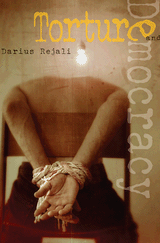This is the official webpage of Torture and Democracy. Torture and Democracy is the most comprehensive study of modern torture yet written. It takes the reader from the late nineteenth century to the aftermath of Abu Ghraib. As the book proceeds from the history of one torture technique to another, it draws the startling conclusion that, as the twentieth century progressed, democracies not only tortured, but set the international pace for torture. Dictatorships may have tortured more, but the United States, Britain, and France pioneered and exported techniques that have become the lingua franca of modern torture: methods that leave no marks. Long before the CIA even existed, police and soldiers turned instead to "clean" techniques, such as torture by electricity, ice, water, noise, drugs, and stress positions.
Rejali makes this troubling case in fluid, arresting prose and on the basis of unprecedented research--conducted in multiple languages and on several continents--begun years before most of us had ever heard of Osama bin Laden or Abu Ghraib. The author of a major study of Iranian torture, Rejali also tackles the controversial question of whether torture really works, answering the new apologists for torture point by point. A brave and disturbing book, this is the benchmark against which all future studies of modern torture will be measured.
Darius Rejali is professor of political science at Reed College and an internationally recognized expert on government torture and interrogation. He is the author of Torture and Modernity: Self, Society, and State in Modern Iran.
You can learn more about Prof. Rejali here as well as descriptions of his current research projects.
Awards
2009 William J. Fulbright Award
2009 Raphael Lemkin Award
About Raphael Lemkin
Reed’s Rejali wins 2007 Human Rights Book Award for Torture and Democracy
Reviews
"Torture and Democracy immediately lays claim to be the most compendious and the most rigorous treatment of the subject yet written. Saul Bellow used to say that we are constantly looking for the book it is necessary to read next. On torture, this is it...Torture and Democracy is the anatomy of sneaky. Rejali regales us with tales of every technique of torture known to man...Rejali's analysis of efficacy is exemplary: at once prudent and trenchant, historically alert and morally sentient."
—Alex Danchev, Times Higher Education
“Documenting modern torture techniques, [Torture and Democracy] is both horrifying and compelling. The consequences of torture are always unpredictable and Rejali argues that torture fails when it’s needed most—in last-minute, ticking bomb scenarios.”
—Karen J. Greenberg, Financial Times
"[A] magisterial study of torture and how it has developed as a social and moral issue with a focus on developments through the last century."
—Scott Horton, Harper's Magazine


